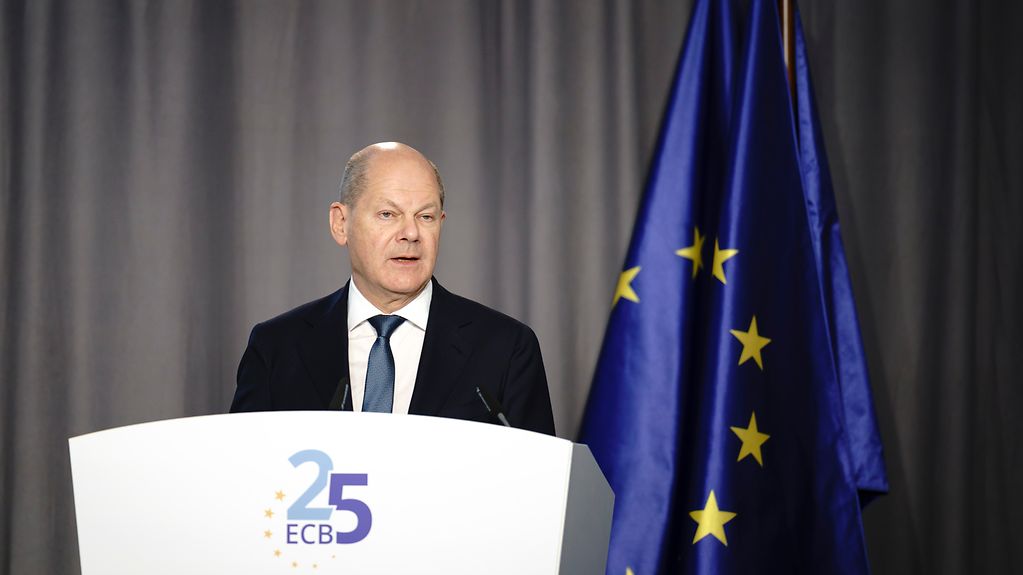Federal Chancellor at the ECB anniversary celebration
The European Central Bank (ECB) has been making a significant contribution to price stability within the Eurozone for the past 25 years. Federal Chancellor Olaf Scholz used the anniversary ceremony to call for: "a renewal of our commitment to Europe today by recommitting ourselves to the euro".

"The euro is irreversible," said the Federal Chancellor at the ceremony, adding that the ECB had played a unique role in this.
Photo: Federal Government / Kugler
Referring to the efforts made by the ECB, particularly during the financial and sovereign debt crisis, the COVID-19 pandemic, and in response to the economic impact of the Russian war on Ukraine, the Federal Chancellor stressed that "the euro has been one of the most successful projects of European integration". The Eurozone had been able to and was still able to defend its currency against all challenges – "the euro," he continued, "is irreversible", and the ECB had played a unique role in this.
The European Central Bank (ECB) serves as the central bank for the Eurozone, i.e., for all states that use the euro as their official currency. Based in Frankfurt am Main, its primary purpose is to stabilise prices within the Eurozone and to keep inflation low, steady, and predictable. It does this by setting and implementing monetary policy, conducting foreign exchange transactions, and managing the member states’ official currency reserves. It ensures the correct functioning of payment systems and issues the euro banknotes.
Fighting inflation
The ECB, which was founded in 1998 as a strong and independent central bank with a clear mandate to maintain price stability within the Eurozone, has remained true to its mandate. Despite the fact that inflation rates were higher last year than at any other time since the introduction of the euro, the ECB is working tirelessly to keep inflation under control. Whilst the Federal Government is fully in favour of this, it also respects the independence of the ECB, because, as the Federal Chancellor pointed out at the anniversary event: "it is this independence that is key to a stable and credible monetary policy." After all, he continued, a currency's value depended largely on trust, and stability and trust were no obstacles to progress. This is why current efforts to develop the digital euro represent an ambitious and forward-looking project that will reinforce the sovereignty of Europe.
Member states provide support for the implementation of the ECB's core tasks
Scholz said that progress on important legislative projects was also necessary to strengthen the Eurozone. The Federal Chancellor emphasised the fact that Germany was doing its part, helping both to complete the Capital Markets Union and to help bring about the Banking Union.
Following the expansionary fiscal policy, which became necessary during the COVID-19 pandemic, the Federal Chancellor said, it was now just as necessary to adjust fiscal policy and oppose inflationary pressure.
An anchor of stability
The Federal Chancellor expressed his gratitude to the current ECB President, Christine Lagarde, as well as to her predecessors for their hard work and dedication throughout the past 25 years and, looking ahead, expressed his hope "that the ECB will continue to be an anchor of stability, a beacon of independence and confidence, and a trailblazer of progress, just as we know it to be."
How the ECB works
One of the ECB’s important objectives is to keep the inflation rate at two percent over the medium term, to which end, it uses a number of instruments:
It specifies the conditions under which banks can borrow from or invest money in the central bank. Usually, when inflation deviates from the two percent target, the ECB reacts by adapting the key interest rate: when inflation is too high, the interest rate is raised, whereas it is cut when the inflation rate is too low.
The ECB's key interest rate decisions are influenced by a number of different economic factors, which makes it difficult to predict the future timing of key interest rate changes. Most recently, the key interest rate was raised to 3.75 percent in early May.
This is done in order to keep exchange rates in balance. It also provides long-term loans to banks at extremely favourable interest rates, on the proviso that the banks go on to lend this money to private individuals and companies, which stimulates bank lending in the real economy.
The ECB is owned exclusively by the central banks of the EU member states, each of which holds a capital share in the ECB and is therefore a shareholder. Each of the central banks makes a certain amount of money available to the ECB to enable it to achieve its objective of keeping prices stable in the Eurozone.